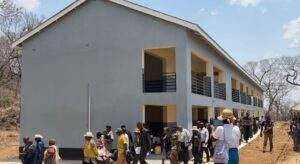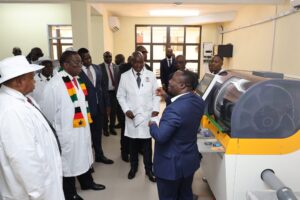President Commissions Bindura University’s PALPO Technologies Production Plant…
5 min read
…A Milestone in Zimbabwe’s Industrial, Technological Revolution
Bindura – Zimbabwe’s journey toward technological sovereignty and industrial modernisation reached a new milestone with His Excellency the President and Chancellor of all State Universities, Dr. Emmerson Dambudzo Mnangagwa, officially commissioned the Bindura University PALPO Technologies Production Plant at the Bindura Industrial Park earlier today.

The state-of-the-art plant, a brainchild of Bindura University of Science Education (BUSE), assembles laptops, tablets, and mobile phones locally — a major breakthrough in the country’s efforts to promote innovation, import substitution, and economic empowerment through science and technology.
At full capacity, the factory has the potential to produce up to 12,000 laptops and tablets, as well as 3,000 mobile phones annually, providing affordable and accessible devices for students, professionals, and other users across the nation.
Addressing dignitaries, students, and industry leaders at the commissioning ceremony, President Mnangagwa hailed the project as a “bold and transformative step” in the implementation of his Government’s Education 5.0 philosophy, which calls upon universities to move beyond theory and become active participants in national production and innovation.

“This production plant stands as a living testimony that our universities are no longer ivory towers of academic theory, but engines of industrialisation and innovation,” said the President. “Bindura University, through this initiative, has aligned itself fully with our national vision of achieving an upper-middle-income economy by 2030. This is what we mean when we say ‘Nyika inovakwa nevene vayo’ — our country will be built by its own people.”
He commended the Bindura University leadership, researchers, and students for turning knowledge into tangible products that can compete regionally and globally, emphasising that local manufacturing of electronic gadgets will help Zimbabwe reduce its import bill and retain value within its borders.
PALPO Technologies Production Plant was established through strategic collaboration between Bindura University, local engineers, and private sector partners.
The project focuses on affordable and user-friendly technology designed to meet the needs of Zimbabweans, particularly students who often struggle to access learning devices due to high costs of imported gadgets.

Speaking at the event, BUSE Vice Chancellor Professor Eddie Mwenje said the innovation reflects the university’s commitment to providing practical solutions to national challenges.
“Our goal is to bridge the digital divide by providing devices that are not only affordable but built to suit our environment and our people’s needs. We are proud to say that every PALPO laptop, tablet, and mobile phone assembled here in Bindura carries the spirit of Zimbabwean innovation,” said Professor Mwenje.
He added that the project would create employment opportunities for graduates and artisans, boost local manufacturing, and support the broader vision of a technology-driven economy.
In a demonstration of versatility and industrial diversity, the PALPO Technologies Production Plant also manufactures non-electronic products such as mouthwash, pine gel, and other household cleaning agents.
These products are developed through the university’s Department of Chemistry and Environmental Science and represent the growing integration of scientific research into commercial production.
By venturing into such production, the university is contributing significantly to import substitution — reducing dependency on imported consumer goods — while fostering local industry development.
“These products, made from locally sourced materials, show that our industries can stand on their own. We can produce what we consume,” remarked Professor Mwenje. “From the laboratory to the marketplace, our students are learning to innovate, manufacture, and manage production — skills that are essential for national development.”
Bindura Industrial Park, where the plant is located, is fast becoming a hub for innovation and enterprise in Mashonaland Central Province.
The development is a model example of effective Public-Private-Academic collaboration — a partnership structure that pools together government support, university research, and private investment to stimulate industrial growth.
The project embodies the essence of Zimbabwe’s reconfigured higher education system, which prioritises Heritage-Based Innovation — solutions grounded in national identity and the practical needs of society.
This is the industrialisation of education — where knowledge is transformed into goods and services.
Through Education 5.0, local universities are producing more than graduates. They are producing manufacturers, innovators, and creators who will transform our economy.
The commissioning of the PALPO plant will not only improve access to digital devices but also stimulate a chain of new business activities, including packaging, logistics, and retail, all of which contribute to local economic growth.
The commissioning of the Bindura University production plant comes at a time when Zimbabwe is accelerating efforts to promote local content, technological advancement, and industrial transformation under the National Development Strategy 1 (NDS1).
By establishing manufacturing capacity in electronics and household consumables, the country is taking concrete steps toward reducing imports, creating employment, and building a self-sustaining industrial base.
The President reiterated that Zimbabwe must not remain a consumer of foreign technology but become an active producer.
“We must move away from importing what we can make ourselves,” President Mnangagwa said.
“This plant is proof that our young scientists, technicians, and innovators have the capacity to meet the demands of our growing digital economy.” He added.
He urged other universities to emulate Bindura’s example by commercialising research outputs and establishing similar production units in their respective provinces. “Every innovation should translate into a product, every idea into an enterprise,” he said.
The local community in Bindura has welcomed the development with great enthusiasm. Residents say the plant has already begun to inject new life into the local economy through job creation and business opportunities.
Local youth, some of whom are graduates of Bindura University, have been recruited as assemblers, technicians, and quality controllers at the plant. Others are involved in supply chain activities, creating a ripple effect of economic empowerment.
“This project has brought jobs and hope,” said Ms. Chipo Marange, a Bindura resident and small business owner. “Our young people are working, our town is growing, and we are proud to see our own university leading such a national initiative.”
The establishment of PALPO Technologies marks a critical step in Zimbabwe’s journey toward technological sovereignty — the ability to produce, maintain, and control its own digital infrastructure and devices.
Experts say this move will strengthen the country’s capacity to participate meaningfully in the global digital economy, while ensuring that local education and industrial sectors remain connected to the demands of the Fourth Industrial Revolution.
The plant’s products are expected to serve schools, universities, government departments, and private consumers, ensuring that technology becomes more accessible to all.
As the national flag fluttered proudly above the newly commissioned plant, it became clear that the Bindura University PALPO Technologies Production Plant is more than a manufacturing facility — it is a symbol of national confidence, innovation, and progress.
Through this initiative, Zimbabwe is reaffirming its determination to chart its own course toward industrialisation, powered by local talent and guided by visionary leadership.
As President Mnangagwa aptly declared during the ceremony:
“Let this plant remind us that no dream is too ambitious, and no innovation too small, when it serves the cause of national development. Together, we are building the Zimbabwe we want — brick by brick, innovation by innovation.”
With such transformative initiatives taking root, the future of Zimbabwean industry — and the young minds driving it — looks brighter than ever.




